
Books That Make Journeys Memorable
What keeps high flyers company while they are on the move
Journeys can be monotonous. Picture a sterile hotel room with a long night to kill; or a 16-hour flight with no hint of sleep. The obvious solution: Video games, TV shows and movies. Sure, there’s that. But here’s a happy, nostalgic truth we discovered while speaking to several frequent flyers. They told ForbesLife India that they still rely on a longtime companion to keep the romance of travel alive: Books. Be it the recliner at an airport or the cramped train bunk, there’s no greater pleasure than snuggling under a blanket and reading away the miles. To paraphrase a popular ad tagline, “Journeys are often made by the books you travel with.”
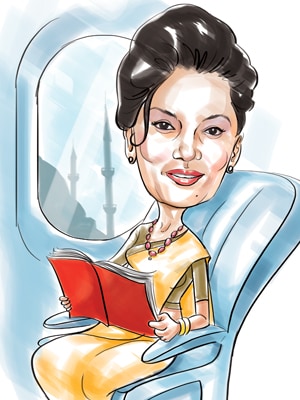
Shabana Azmi
Actor / Goodwill Ambassador of the United Nations Population Fund (UNPFA)
On flights the order is: Magazine first, film second, and postponing the reading of scripts (which require focussed attention) till it can no longer be pushed away. Also, I prefer paperbacks on journeys; I never read ebooks, and hardly ever carry a hardbound. The hardbound is such a romantic idea but completely impractical!
I make random selections [of books] and also read the ones recommended by friends, and those that get good reviews. I prefer female authors.
I am not particularly fond of fast-paced novels, but like reading Indian authors in English. I love the English language, its turn of phrase, its humour and romance. I inevitably read three books at a time, and sometimes start reading from the back… such a terrible thing to do! Also, I always carry Faiz Ahmed Faiz’s Saare Sukhan Hamare, my father Kaifi Azmi’s book of poetry, Selected Poems, and my husband Javed Akhtar’s Tarkash. Though it has nothing to do with travel, I loved Open by Andre Agassi. It is a book I always recommend. I was rivetted by it and wanted to call him up to tell him how moved I was… and this, when I don’t understand anything about tennis. And Orhan Pamuk’s Istanbul: Memories of a City made me want to visit Turkey.
Reading can be relaxing, but it also depends on the kind of book. On a flight, you get uninterrupted time to read, and your focus is better. So, it can be an intense activity too. I often cry while reading, and it is paisa vasool (money’s worth) if a book can be a cathartic experience.
(As told to Sohini Mitter)
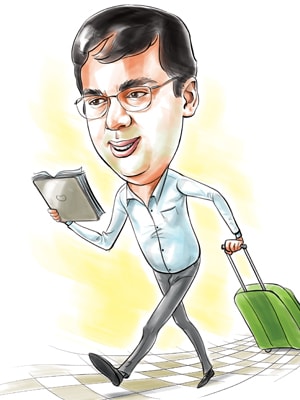
Viswanathan Anand
Chess Grandmaster
Since there is nothing much to do on a flight, I enjoy spending my time reading (I also try and catch a movie in between). I can read whatever I want to since ebooks make it easier to carry your library. I don’t move around with hardcovers and paperbacks; it’s ebooks and emagazines all the way.
When I am travelling, I mostly do catch-up reading. Usually, I have a backlog of 2-3 issues of The Economist on my tablet, which takes about 3-4 hours. Besides, I like reading on mathematics and astronomy. Andrew Hodges’ One to Nine: The Inner Life of Numbers is one book I go back to often. It’s quite interesting to keep discovering new things about numbers. I also enjoy (British author) Simon Singh’s writings.
I normally read very esoteric themes. [My wife] Aruna reads a lot of current books and sometimes recommends them to me. She introduced me to Amish Tripathi (Shiva Trilogy). I loved his trilogy. I also like books with a focus on India, like those by Edward Luce and Pavan K Varma. As cheesy it may sound, we took an Angels and Demons tour when we travelled to Rome. It was fun and, in the night, the Castel Sant’Angelo gave us the shivers
(As told to Kathakali Chanda)
Illustrations by Chaitanya Dinesh Surpur
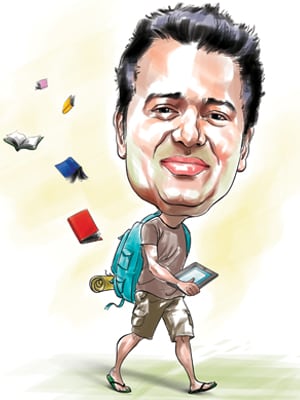
Aakash Chopra
Former Test cricketer / Sports Analyst
I spend about 30-40 percent of my travel time on reading. I was completely sold on hard copies earlier, but have migrated [to ebooks] recently. Kindle is what keeps me occupied when I’m travelling.
My reading preferences don’t change during travel. I’m very particular about what I read, so I rarely experiment. For instance, I’m more into non-fiction these days.
I never follow recommended reads by travel magazines, but books have inspired me to travel. For instance, I went to Scotland after reading the Harry Potter series.
If there is one book that I loved reading while travelling and would recommend it to others, it has to be the Emperor Series by [British historical fiction author] Conn Iggulden.
Is reading essential while travelling? To each his own but I prefer to use my time wisely and hence read very often.
(As told to Kathakali Chanda)
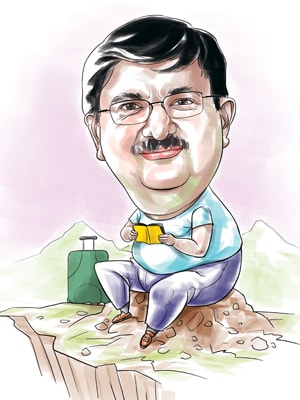
Salil Tripathi
Director - Emerging Issues, Institute for Human Rights and Business / Writer
My travels are often long flights or long train rides; I read for at least 2-3 hours. It is great as I’m uninterrupted by emails. Once at the destination, I tend to continue reading, but rarely more than an hour a day.
Of course, Kindle is great, not only because it allows you to carry more books, but also because you can read what you want and others don’t find out what you are reading. This is important in closed or intrusive societies, where you might be reading something relevant to the place, but it is banned there. In general, though, I prefer paperbacks, since hardbound books add a lot of weight. However, sometimes your choices are governed by what you have, not what you wish you had.
I prefer reading a book about the place I am visiting. It could be fiction or non-fiction. Large books that tell everything about a place—from a contemporary perspective—are great, and are usually written by foreign correspondents. Novels that focus on particular periods of history are also excellent. I’m better prepared to face a destination if I know a bit more about it than what the guidebooks suggest.
There is no particular author who is a favourite as such, since my travel reading is so often influenced by where I am going, and there are very few writers who have written about all parts of the world. But if (Ernest) Hemingway, Jan Morris, or (Graham) Greene have written about the place, then I’m likely to pick it up.
I really learnt a lot more about South Africa by reading Allister Sparks’ The Mind of South Africa during my first visit there. Sparks was the editor of The Rand Daily Mail and an excellent journalist. He wrote with great verve, and revealed the repugnant aspects of Apartheid without getting angry himself, letting anecdotes tell the story. He also took you to places (which I ended up going to), describing them beautifully and making the Apartheid experience vivid. Karen Blixen’s Out of Africa convinced me that I had to go to Kenya and see the Ngong Hills from her farm, and I did.
Reading while travelling is great: It shuts people up if they want to talk to you (assuming you’re travelling alone). Besides, you can always eavesdrop while pretending to read.
(As told to Sohini Mitter)
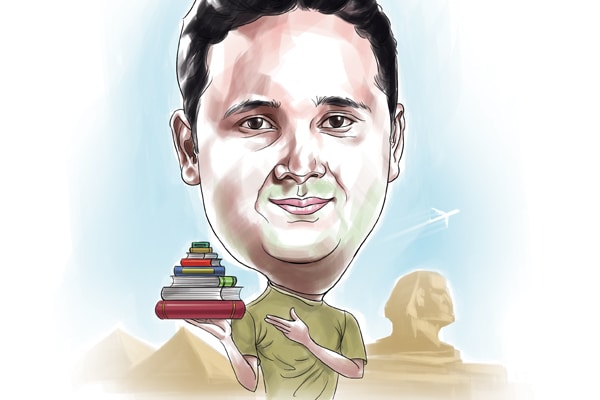
Amish Tripathi
Author
My travel reading tastes aren’t any different from what I normally read. I prefer non-fiction, mostly in the areas of my interest—spirituality, history, time, politics, etc. And reading during journeys may not necessarily be light. For instance, if you are reading a religious text like The Vedas or The Upanishads, it can be an intense activity. You can’t just flip through them. You will sit and think about what you are reading.
I read a lot of magazines when I travel. And typically carry 2-3 books along with me. That includes one which is always in my hand baggage. Paperbacks it is, because it is a nightmare to carry a hardbound, and I haven’t entirely switched over to ebooks.
I don’t ever go by recommendations in travel magazines. I turn to my family and friends for suggestions, and fortunately I am surrounded by people who read a lot. But I tend to welcome recommendations from locals. When I went to Egypt, they suggested I pick up works of Naguib Mahfouz, who is a Nobel Laureate. I read his popular novel Akhenaten, Dweller in Truth (a book on
the conflict between old and new religious truths). In India, who would have ever recommended such a book to me?
I also enjoyed Wilbur Smith’s River God, which is set in Egypt. Another great travel book is 1,000 Places to See Before You Die (by Patricia Schultz) and I would recommend it to people.
For me, reading is very relaxing, and I end up doing it a lot while travelling.
(As told to Sohini Mitter)
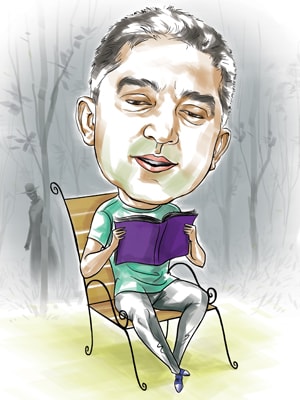
Harish Bijoor
Brand Strategist / Founder and CEO, Harish Bijoor Consults Inc
The only way I can catch up on my reading is when I’m on the move. Most of my reading is done mid-air. I love paperbacks; they are light, convenient and real… in between the cumbersome hardbounds and the completely virtual ebooks.
My travel bag has an iPad that is loaded with ebooks, mostly fiction, while the non-fiction reads are picked up from airport bookstalls. I flip between one and the other. There are times when I am reading four books at the same time. It keeps me agile and alive.
My travel reading depends on my mood at that point of time. Non-fiction can cause fatigue. I love reading thrillers on long journeys. Anyone from Dan Brown to Jeffrey Archer suits me fine. I also look at Condé Nast Traveller and Outlook Traveller to know what the world is reading. There are times when I am nudged by their recommendations.
When I was en route to Istanbul, rather coincidentally, I was reading Orhan Pamuk’s My Name is Red. It made a difference, and gave me a new perspective about Turkey. When you are reading about a country you are physically in or about to enter, it makes a huge difference to your travel experience. It adds a degree of proximity and reality to an otherwise distant feeling that books create and build in you.
Dan Brown’s The Da Vinci Code had me running to London with much more mystique and awe to see its churches, their architecture, cemeteries and so on.
I do believe reading or writing is essential when you travel. I do both. The mind is at rest and you are in motion, and at the same time you are not. It is a good time to snuggle up in that blanket, call for a hot coffee, and read your favourite book.
(As told to Sohini Mitter)
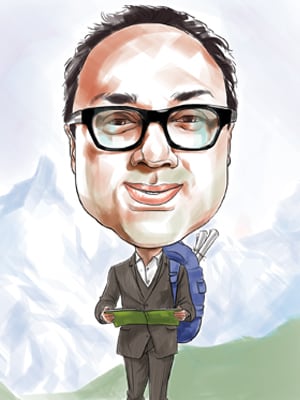
David Abraham
Fashion Designer / Creative Director of Abraham & Thakore
I always carry a book when I travel. I start reading while waiting at the departure lounge and carry on through the flight. I read non-stop unless the on-board movie offering is better. I prefer paperbacks, but sometimes new editions are initially hardbound and I don’t have an option but to carry them. I’ve tried ereaders but, for some reason, I lose the plot very soon. I can read single articles, magazines on a tablet, but a full-length novel defeats me. I need to work on this because of the sheer convenience.
When I travel, I carry along whatever I’m reading at the moment. There are occasions when I’ve specially bought a book on the destination I’m travelling to. For instance, I read Orhan Pamuk’s Istanbul when I was in Istanbul, The Hungry Tide by Amitav Ghosh when I went to the Sunderbans. Such reads add a dimension to one’s travel experience. One book that I particularly loved reading while travelling was Ghosh’s The Glass Palace. The book chronicles life in Burma and Bengal in times of enormous upheaval. I was travelling to Myanmar some years ago and the poignancy of the novel brought to life several other aspects of the country. At that time, Aung San Suu Kyi was under house arrest, there was a sense of sadness in the air; the book echoed the mood of the country.
For me, Patagonia is a dream destination, thanks to Bruce Chatwin’s In Patagonia. Paul Bowles’ books have made Tangier another place I really want to travel to. Of course, the places must have changed so much since these books were written.
Reading is essential, whether one travels or not. Good fiction helps people escape mundane reality and be a traveller all the time.
(As told to Kathakali Chanda)
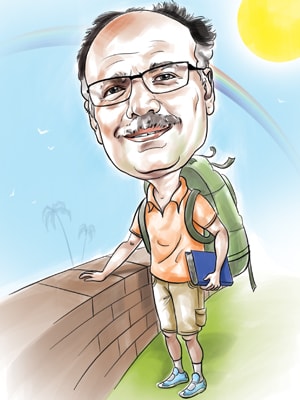
Capt (retd) GR Gopinath
Founder of Air Deccan / Retired captain in the Indian Army
Whenever I undertake long journeys, I carry a bag with an assortment of books—usually a novel, a book of poems, a collection of essays, or diaries of famous writers. Depending on the time of day and my mood, I choose what I wish to read. On shorter journeys, I have a novel and a book of short stories. I normally carry paperbacks. Hardbound books are for reading at home.
I read books on philosophy when I am travelling. I enjoy reading scientists such as Richard Feynman, Werner Heisenberg, Albert Einstein, Karl Popper or James Jeans, who write on life. I read many French philosophers and novelists including Albert Camus and Jean-Paul Sartre. And Russian novelists such as Ivan Turgenev, Leo Tolstoy, Fyodor Dostoyevsky are ideal for long trips. I also read a lot of Rabindranath Tagore’s poetry. I dip into it whenever I need sustenance.
I do check Condé Nast Traveller and National Geographic regularly, but don’t pick up the typical touristy travel books. I’d rather go for travel books by great writers such as George Orwell, John Steinbeck, William Somerset Maugham and Aldous Huxley. I’m a bit old-fashioned that way. Recently, I loved Turgenev’s short stories, Maugham’s writings on Spain especially Catalina.
Steinbeck’s Travels with Charley (on his road travels in the US) is one book that inspired me to visit the country. And of course, I love travelling in India when I read Hugh and Colleen Gantzer or Ruskin Bond.
Books are the best travel companions. I would be lost without them.
(As told to Sohini Mitter)
(This story appears in the July-Aug 2014 issue of ForbesLife India. To visit our Archives, click here.)




